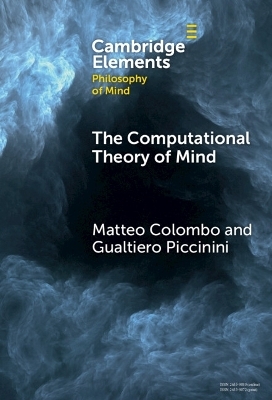
The Computational Theory of Mind
Seiten
2023
Cambridge University Press (Verlag)
978-1-009-45407-0 (ISBN)
Cambridge University Press (Verlag)
978-1-009-45407-0 (ISBN)
This Element supports the Computational Theory of Mind by its contribution to solving the mind-body problem, its ability to explain mental phenomena, and the success of computational modelling and artificial intelligence.
The Computational Theory of Mind says that the mind is a computing system. It has a long history going back to the idea that thought is a kind of computation. Its modern incarnation relies on analogies with contemporary computing technology and the use of computational models. It comes in many versions, some more plausible than others. This Element supports the theory primarily by its contribution to solving the mind-body problem, its ability to explain mental phenomena, and the success of computational modelling and artificial intelligence. To be turned into an adequate theory, it needs to be made compatible with the tractability of cognition, the situatedness and dynamical aspects of the mind, the way the brain works, intentionality, and consciousness.
The Computational Theory of Mind says that the mind is a computing system. It has a long history going back to the idea that thought is a kind of computation. Its modern incarnation relies on analogies with contemporary computing technology and the use of computational models. It comes in many versions, some more plausible than others. This Element supports the theory primarily by its contribution to solving the mind-body problem, its ability to explain mental phenomena, and the success of computational modelling and artificial intelligence. To be turned into an adequate theory, it needs to be made compatible with the tractability of cognition, the situatedness and dynamical aspects of the mind, the way the brain works, intentionality, and consciousness.
1. Introduction; 2. Historical background; 3. Computing systems; 4. Computation in physical systems; 5. Why believe CTM; 6. Challenges to CTM; 7. Conclusions; References.
| Erscheinungsdatum | 28.11.2023 |
|---|---|
| Reihe/Serie | Elements in Philosophy of Mind |
| Zusatzinfo | Worked examples or Exercises |
| Verlagsort | Cambridge |
| Sprache | englisch |
| Maße | 160 x 235 mm |
| Gewicht | 276 g |
| Themenwelt | Geisteswissenschaften ► Philosophie |
| Geisteswissenschaften ► Psychologie ► Allgemeine Psychologie | |
| Geisteswissenschaften ► Psychologie ► Verhaltenstherapie | |
| Naturwissenschaften ► Biologie ► Humanbiologie | |
| Naturwissenschaften ► Biologie ► Zoologie | |
| ISBN-10 | 1-009-45407-2 / 1009454072 |
| ISBN-13 | 978-1-009-45407-0 / 9781009454070 |
| Zustand | Neuware |
| Informationen gemäß Produktsicherheitsverordnung (GPSR) | |
| Haben Sie eine Frage zum Produkt? |
Mehr entdecken
aus dem Bereich
aus dem Bereich
Buch | Softcover (2024)
Hogrefe Verlag
34,95 €


